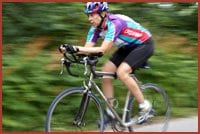Nicole LaVio-lette knows international queer sporting events — she’s been attending them since Vancouver hosted the Gay Games in 1990. In fact, she’s won medals at every one of those events — bronze, silver and gold — in both team and individual events, all of them in cycling.
“My first Gay Games were in 1990 in Vancouver,” LaViolette says. “I’ve participated in four Gay Games, and this will be my fifth international gay and lesbian sporting event.”
LaViolette, who teaches law at the University of Ottawa, has been cycling competitively since 1989, mostly locally with a few road races here and there.
“I used to do a bit more racing generally when I was younger,” she says. “Now I still do some local time-trials in cycling — it’s a weekly event that my cycling club holds — and every so often I might do a road race, but not so much anymore.”
This year, LaViolette hopes to compete in three cycling events. “One of them is what we call an individual time trial, which is a timed event — you’re not in a pack, you’re not competing with other people. You just go off on a course on your own and they time you, and the fastest time wins. The distance is about 12 kilometres, which is quite short.”
The second event will be a road race, which is the kind of pack race that most people are familiar with seeing. The final event, a team time trial, is still up in the air since the teams won’t be set until the Montreal organizers see who is there. Team time trials are similar to the individual events, but with four cyclists working together to get the fastest time.
“One of my proudest Gay Games accomplishments was a team time trial in Amsterdam,” LaViolette says of the 1998 Gay Games. “I was riding with two Americans and a French cyclist, and we had some pretty good competition. There were eight women’s time trial teams at that event, and that was the most that I’ve seen to date, and there was certainly at least one other team that was very comparable to us in terms of ability. We were on the course at the same time, and we didn’t realize it, but we were seconds apart every loop that we went, so they’d be a second ahead and then a second behind. We finally pulled ahead of them at the last loop of the circuit, and we won the gold medal.”
Team time trials are a rarity in mainstream sport, only sometimes seen in the Tour de France with eight cyclists lined up, rotating the lead.
Events on this scale are something that LaViolette speaks fondly of. “It’s an amazing event, just by the numbers,” she says. “Even in the biggest cities, you get there and there’s the 10,000 athletes plus all the other people who come for the event, so you really feel like you take over a city. For a week you have this amazing atmosphere in cities like Sydney, Amsterdam or New York that you would not have, even with a thriving gay and lesbian community. Once you have that kind of arrival of all these people, it really changes the tone of the city and I really enjoy sports, so it’s a really neat experience to be at a sporting event where there is that kind of community feeling that you wouldn’t normally have in mainstream sporting events.”
And what does this veteran look forward to most about Montreal? “One thing that I think I will enjoy is knowing the city already and seeing how it will be transformed for a week by this event,” LaViolette says. “This is kind of like an interesting thing, to be able to go almost to your backyard and see it completely transformed for a week as people from around the world with different events, do cultural things, and that’s going to be a fun part. When you go to a city you’ve never been to before, you can’t contrast what it is when the games aren’t there.”
As for the future, LaViolette has yet to make plans on attending the next Outgames in Copenhagen in 2009. “To be honest, I’m kind of seeing Montreal as my last one that I plan for,” she says. “On the other hand, I’ve never been to Denmark. I don’t even know if I’ll be competing in cycling by then, but there’s so many opportunities to try new things. I took up hockey a few years ago, so that may be a way to make the experience different and actually participate in a different sport. I haven’t thought that far ahead.”
For someone caught in the Gay Games/Outgames schism, LaViolette also sees change in the future. “I’m likely to go to the Outgames more than the Gay Games at this point. I think the Gay Games will likely become a US-based sporting event, and the Outgames has more potential to become the international event, so we’ll see if that holds true.”


 Why you can trust Xtra
Why you can trust Xtra


